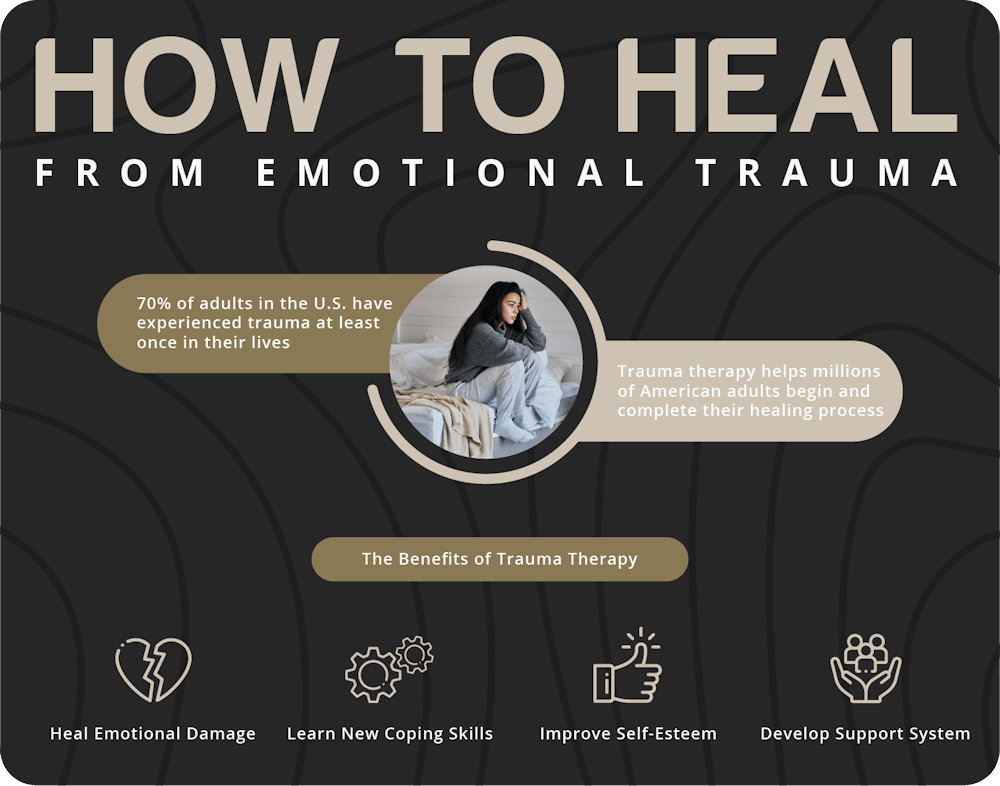
Psychological trauma can affect your life for many years after the event or situation that caused it. Trauma doesn’t easily resolve itself. Further, it’s especially difficult to try to do it on your own.
At Westwind Recovery® in Los Angeles, our trauma therapy program helps you learn about the emotions your trauma caused, where they originate, and how to react in a healthier manner. Finding help allows you to restore happiness and stability to your life.
Marginalized communities often experience unique traumas. For example, people of color may suffer from trauma due to police violence or microaggressions. The LGBTQ community can suffer from trauma due to conversion therapy or discrimination. And trauma is often passed down through generations in families with a history of trauma.
No matter what form your trauma takes, our team at Westwind Recovery® is Los Angeles is here to help you work through it. We understand the challenges you’re facing and will help you develop the tools you need to heal.
What is Trauma Therapy?
Trauma therapy programs are a form of mental health treatment. In this treatment, therapists assist clients in overcoming psychological trauma. A traumatic event is one in which you perceive a threat to your life, bodily integrity, or sanity. Trauma happens when your ability to cope is completely overwhelmed.
Thus, to regain your footing you need professional help. In any trauma therapy program, you begin the healing process by discovering what is causing your pain. Since trauma from the past can threaten the life you live now, it’s vital to get to the heart of what is causing your pain. Trauma therapy programs are designed to do just that, locate the root cause.
Perhaps you witnessed or experienced a traumatic event firsthand or you encountered trauma secondhand. Either way, your reactions to traumatic events reveal themselves over time. Thus, a trauma happening in adulthood can be equally devasting as one having happened in childhood and vice versa. Additionally, you may not feel the effects of your trauma until years after the event.
You may start behaving differently, feeling out of sorts, or reacting inappropriately to ordinary situations or persons. All the while, you’ll be at a loss about why, which can:
- Provoke anxiety or depression
- Create tensions in your intimate, personal, and professional relationships
- Lead to substance abuse and even addiction
your therapist is working hard to help you reach your goals.
What Are Some Common Examples of Trauma?
Childhood trauma can be any type of physically or emotionally painful or scary event that a child experiences. Examples include:
– Having a parent who is an alcoholic or has mental health issues
– Being the victim of physical, emotional, or sexual abuse
– Witnessing violence in the home or community
– Experiencing a natural disaster
– Being in a car accident
– Going through surgery
– Losing a loved one
– Having a chronic illness
Adults can experience trauma from many different types of events as well. Here are some examples:
– Sexual assault or rape
– Domestic violence
– War or combat trauma
– Childhood abuse or neglect that was never resolved
– A serious accident, such as a motor vehicle accident or a fall
– Natural disasters, such as a tornado, hurricanes, floods, or fire
– A terrorist attack
Trauma can have a profound effect on your life. It can cause physical and emotional problems that may last for years. If you’ve experienced trauma, you may feel scared, confused, and alone.
You may have trouble sleeping or eating. You may feel like you’re in danger all the time, even when you’re not. You may have flashbacks of the event or startle easily. You may feel numb or disconnected from others.
What Are the Long-Term Effects of Trauma?
Trauma can lead to long-term physical and emotional problems. These include:
– Anxiety
– Depression
– Post-traumatic stress disorder (PTSD)
– Substance abuse
– Relationship problems
– Job loss
– Financial problems
If you’re experiencing any of these problems, it’s important to get help. Trauma therapy can help you heal the hurt trauma has caused. Trauma therapy is a type of counseling that focuses on your experience of trauma and its effects on your life.
It can help you make sense of what happened and develop skills to cope with trauma in the future. Los Angeles offers many resources for trauma survivors. To find a trauma therapist in Los Angeles, contact Westwind Recovery® today.
How Does Trauma Lead To Substance Abuse?
Substance abuse is a common way people try to cope with trauma. Alcohol and drugs can seem like an easy way to numb the pain and forget what happened. But using alcohol or drugs will only make your problems worse in the long run. Trauma therapy can help you learn other ways to cope with trauma.
Self-medication is a common way people try to cope with trauma. Trauma therapy can help you deal with the aftermath of trauma. It can help you make sense of what happened and develop skills to cope with trauma in the future. Trauma therapy is a type of counseling that is designed to address the specific needs of trauma survivors.
What Happens in Trauma Therapy in Los Angeles?
During trauma therapy, you will work with a therapist to process your trauma. You will talk about your experience in a safe and supportive environment. This can help you make sense of what happened and start to heal the emotional wounds of trauma.
Trauma therapy can help you learn new coping skills. You will also work on improving your self-esteem and developing a support system. This can help you build a foundation for healing.
Trauma therapy is not easy. It can be difficult to relive the trauma, but it is often necessary to begin the healing process. With the help of a therapist, you can begin to heal the emotional damage caused by trauma.
What Are the Responsibilities of the Therapist in Trauma Therapy in Los Angeles?
The trauma therapist’s responsibilities include providing a safe and supportive environment, helping the client make sense of the trauma, and teaching new coping skills. The therapist will also help the client improve their self-esteem and develop a support system.
What Are the Benefits of Trauma Therapy?
Trauma therapy can help you heal the emotional damage caused by trauma. It can also help you learn new coping skills, improve your self-esteem, and develop a support system.
What Are Some of the Challenges of Trauma Therapy?
Some of the challenges of trauma therapy include reliving the trauma, dealing with difficult emotions, and finding a therapist you trust. If you are considering trauma therapy, it is important to find a therapist you trust in order to get the most out of therapy. Trust is essential in trauma therapy because the therapist will be helping you explore difficult memories and emotions.
If you are looking for trauma therapy in Los Angeles, there are many resources available. The Los Angeles County Department of Mental Health offers a variety of trauma-related services, including trauma-focused cognitive behavioral therapy (TF-CBT) and eye movement desensitization and reprocessing (EMDR).
In addition to county services, there are many private therapists who specialize in trauma therapy. If you are considering trauma therapy, it is important to find a therapist who is a good fit for you. When choosing a therapist, it is important to consider their experience, training, and approach to treatment.
Who Would Benefit the Most From Trauma Therapy in Los Angeles?
Trauma therapy can be beneficial for anyone who has experienced trauma. However, it is important to find a therapist who is a good fit for you and your needs. When choosing a therapist, it is important to consider their experience, training, and approach to treatment.
How to Build a Relationship With a Therapist
Building a relationship with a therapist can be a daunting task. However, it is important to remember that therapy is a two-way street. In order to get the most out of therapy, you need to be an active participant in your treatment.
Here are some tips for building a successful therapeutic relationship:
- Be honest with your therapist. It is important to be open and honest with your therapist about your thoughts, feelings, and experiences.
- Set realistic expectations. It is important to set realistic expectations for therapy. Remember that change takes time and progress will not always be linear.
- Be patient. The therapeutic process takes time and patience. Trust that your therapist is working hard to help you reach your goals.
Trauma Therapy Program Types
Often, the severity of symptoms will determine the treatment options available. However, every trauma therapy program seeks to reduce the amount of emotional and psychological turmoil you are enduring.
Westwind Recovery® offers several different psychiatric modalities such as:
- Cognitive Behavioral Therapy (CBT)
- Psychodynamic psychotherapy
Cognitive-Behavioral Therapy is a trauma therapy that focuses on helping you understand how your thoughts and beliefs are affecting your emotions and behavior. CBT can be used to help you challenge and change negative thinking patterns, improve communication skills, and learn healthy coping mechanisms.
Psychodynamic psychotherapy is trauma therapy that focuses on helping you understand the unconscious factors that are influencing your thoughts, emotions, and behavior. This type of trauma therapy can help you gain insight into your past experiences and develop healthier ways of coping with trauma.
Both CBT and psychodynamic psychotherapy are effective treatment modalities for trauma. However, the type of trauma therapy that is right for you will depend on your individual needs and preferences.
We design these trauma therapy programs among others to produce dramatic healing for every client we see. Because everyone’s trauma is different, treatments must be designed to fit individual needs. Our staff understands the uniqueness of your experience. Westwind Recovery® has the knowledge and compassion to work with you to reveal, explore, and heal your trauma.
Westwind Recovery®
Many people are oblivious to the fact they are suffering from trauma. For some, the thought simply never occurs to them. Yet, they are acutely aware of their unhappiness, poor mental health, or substance abuse. You can’t treat what you don’t understand.
Thus, Westwind Recovery®’s trauma therapy programs in Los Angeles can help you heal.
By allowing you to recognize your trauma and teaching new coping skills, it becomes easier and safer to regain control of your life. You can enjoy life again once the weight of trauma has been lifted.
Contact Westwind Recovery® for more information about the trauma therapy program.

Dr. Deena is the Chief Clinical Officer of Westwind Recovery®, an award-winning outpatient treatment center in Los Angeles where she oversees the clinical and administrative program and treatment methods. Dr. Deena is a doctor of psychology and licensed clinical social worker since 1993. LCSW #20628. Originally from the East Coast, Dr. Deena has worked running treatment centers, worked as a therapist in psychiatric hospitals as well as school settings and currently has a thriving private practice in the LA area. Dr. Deena has appeared regularly on the Dr. Phil Show as an expert since 2003. She has also been featured on many other TV shows, podcasts and has contributed to written publications as well as podcasts.






